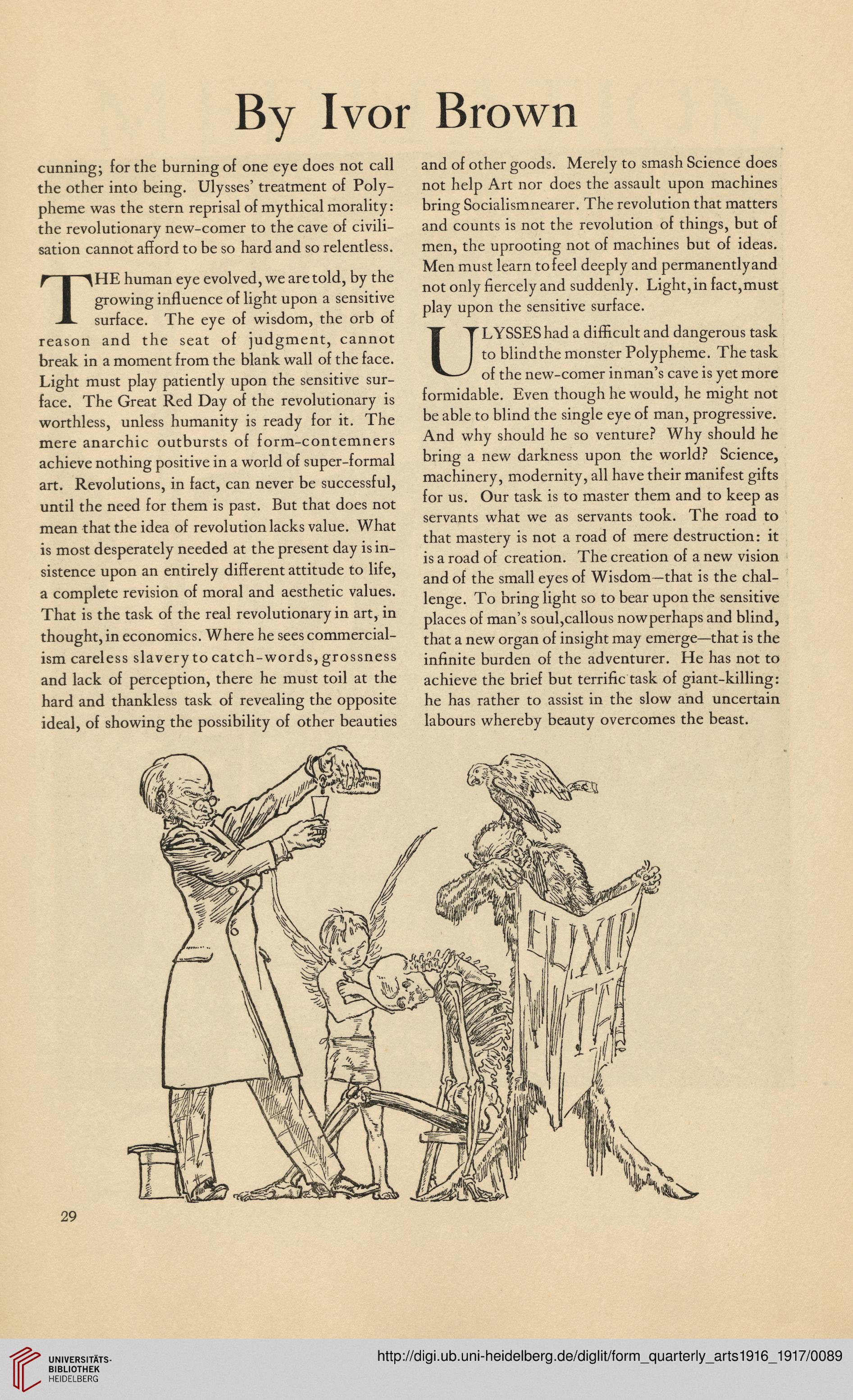By Ivor Brown
cunning; forthe burningof one eye does not call
the other into being. Ulysses’ treatment of Poly-
pheme was the stern reprisal of mythical morality:
the revolutionary new-comer to the cave of civili-
sation cannot afford to be so hard and so relentless.
THE human eye evolved, we are told, by the
growing influence of light upon a sensitive
surface. The eye of wisdom, the orb of
reason and the seat of judgment, cannot
break in a moment from the blank wall of the face.
Light must play patiently upon the sensitive sur-
face. The Great Red Day of the revolutionary is
worthless, unless humanity is ready for it. The
mere anarchic outbursts of form-contemners
achieve nothing positive in a world of super-formal
art. Revolutions, in fact, can never be successful,
until the need for them is past. But that does not
mean that the idea of revolution lacks value. What
is most desperately needed at the present day is in-
sistence upon an entirely different attitude to life,
a complete revision of moral and aesthetic values.
That is the task of the real revolutionary in art, in
thought, in economics. Where he sees commercial-
ism careless slavery to catch-words, grossness
and lack of perception, there he must toil at the
hard and thankless task of revealing the opposite
ideal, of showing the possibility of other beauties
and of other goods. Merely to smash Science does
not help Art nor does the assault upon machines
bring Socialismnearer. The revolution that matters
and counts is not the revolution of things, but of
men, the uprooting not of machines but of ideas.
Men must learn tofeel deeply and permanentlyand
not only fiercely and suddenly. Light,in fact,must
play upon the sensitive surface.
ULYSSEShad a difficult and dangerous task
to blindthe monster Polypheme. The task
of the new-comer inman’s cave is yet more
formidable. Even though he would, he might not
be able to blind the single eye of man, progressive.
And why should he so venture? Why should he
bring a new darkness upon the world? Science,
machinery, modernity, all have their manifest gifts
for us. Our task is to master them and to keep as
servants what we as servants took. The road to
that mastery is not a road of mere destruction: it
is a road of creation. The creation of a new vision
and of the small eyes of Wisdom—that is the chal-
lenge. To bring light so to bear upon the sensitive
places of man’s soul,callous nowperhaps and blind,
that a new organ of insight may emerge—that is the
infinite burden of the adventurer. He has not to
achieve the brief but terrific task of giant-killing:
he has rather to assist in the slow and uncertain
labours whereby beauty overcomes the beast.
29
cunning; forthe burningof one eye does not call
the other into being. Ulysses’ treatment of Poly-
pheme was the stern reprisal of mythical morality:
the revolutionary new-comer to the cave of civili-
sation cannot afford to be so hard and so relentless.
THE human eye evolved, we are told, by the
growing influence of light upon a sensitive
surface. The eye of wisdom, the orb of
reason and the seat of judgment, cannot
break in a moment from the blank wall of the face.
Light must play patiently upon the sensitive sur-
face. The Great Red Day of the revolutionary is
worthless, unless humanity is ready for it. The
mere anarchic outbursts of form-contemners
achieve nothing positive in a world of super-formal
art. Revolutions, in fact, can never be successful,
until the need for them is past. But that does not
mean that the idea of revolution lacks value. What
is most desperately needed at the present day is in-
sistence upon an entirely different attitude to life,
a complete revision of moral and aesthetic values.
That is the task of the real revolutionary in art, in
thought, in economics. Where he sees commercial-
ism careless slavery to catch-words, grossness
and lack of perception, there he must toil at the
hard and thankless task of revealing the opposite
ideal, of showing the possibility of other beauties
and of other goods. Merely to smash Science does
not help Art nor does the assault upon machines
bring Socialismnearer. The revolution that matters
and counts is not the revolution of things, but of
men, the uprooting not of machines but of ideas.
Men must learn tofeel deeply and permanentlyand
not only fiercely and suddenly. Light,in fact,must
play upon the sensitive surface.
ULYSSEShad a difficult and dangerous task
to blindthe monster Polypheme. The task
of the new-comer inman’s cave is yet more
formidable. Even though he would, he might not
be able to blind the single eye of man, progressive.
And why should he so venture? Why should he
bring a new darkness upon the world? Science,
machinery, modernity, all have their manifest gifts
for us. Our task is to master them and to keep as
servants what we as servants took. The road to
that mastery is not a road of mere destruction: it
is a road of creation. The creation of a new vision
and of the small eyes of Wisdom—that is the chal-
lenge. To bring light so to bear upon the sensitive
places of man’s soul,callous nowperhaps and blind,
that a new organ of insight may emerge—that is the
infinite burden of the adventurer. He has not to
achieve the brief but terrific task of giant-killing:
he has rather to assist in the slow and uncertain
labours whereby beauty overcomes the beast.
29




